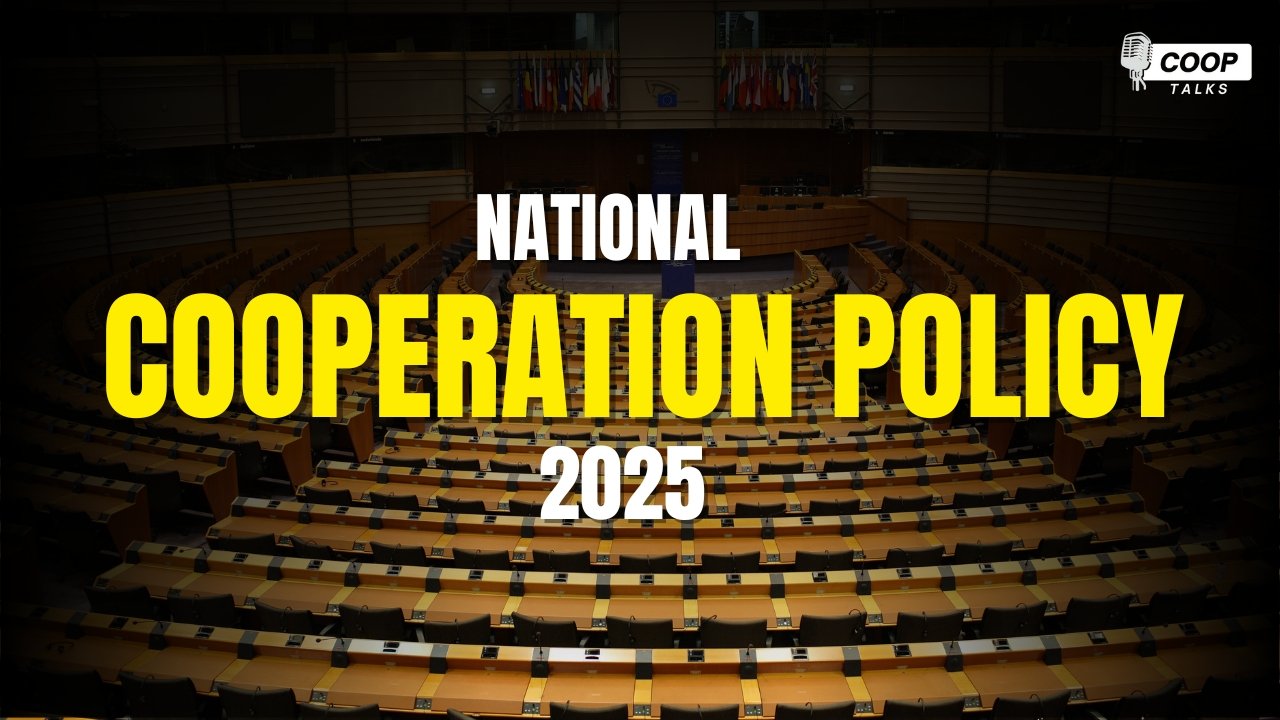
Dr.G.Veerakumaran
Former Professor and Head,
Department of Cooperative Management,
College of Cooperation, Banking and Management,
Kerala Agricultural University
KAU Post, Thrissur, Pin: 680656,
Email: g.veeran@retd.kau.in,
Mobile: 9496419190.
On 24th July 2025, the Union Home Minister and Minister for Cooperation, Shri Amit Shah, unveiled the long-standing National Cooperation Policy – 2025 in New Delhi, twenty three years after previous National Policy on Cooperatives 2002, was launched. Both the Prime Minister and the Minister for Cooperation have reiterated that cooperation is part of Indian heritage and culture. The Chairman of the drafting committee has endorsed them by stating that their guidance has been pivotal in reimagining the cooperative sector as a dynamic pillar of inclusive and sustainable development. The draft with a background and nine chapters draws the strategic move to cooperativise the economy of masses. Quite interestingly the report starts with defining the terms cooperation and cooperativism, where in the emphasis was given for leveraging the efficiency, innovation, and market dynamism while championing the equity, inclusivity and social welfare principles. The driving force for the new policy is that the Prime Minister’s vision of Sahkar-se-Samriddhi (Cooperation to Prosperity) for Atmanirbhar Bharat (self-reliant India) during Amrit Kaal (Era of empowered and inclusive economy). The new policy is also warranted at a time when the union government recognised the formation of cooperatives as a fundamental right through a constitutional amendment. In order to substantiate their stand, the report briefly highlighted the steps taken by the Ministry of Cooperation, GOI after its establishment in 2021.
The National Cooperation Policy – 2025 has been drafted with the following six strategic mission pillars of development.
- Strengthening the Foundation – Legal reforms, better governance, access to finance, digitalization.
- Promoting Vibrancy – Creating business ecosystems, expanding exports and rural clusters.
- Making Cooperatives Future-Ready – Technology integration, professional management, cooperative stack.
- Promoting Inclusivity and Deepening Reach – Promoting cooperative-led inclusive development and cooperatives as a people’s movement.
- Entering New and Emerging Sectors – Biogas, clean energy, warehousing, healthcare, etc.
- Shaping Young Generation for Cooperative Growth – Courses, training, employment exchanges.
Source : https://static.pib.gov.in/WriteReadData/
specificdocs/documents/2025/aug/doc202582598301.pdf
During this technology driven era, the policy befittingly drafted its mission as to facilitate the transformation of cooperative enterprises into professionally managed, transparent, technology-enabled, vibrant, and responsive economic entities to support production by the masses (members). The mission is also translated in to 16 objectives to be achieved in a ten- years time frame. The foremost strategic mission pillar is ‘strengthening the foundation’ which has three objectives and suitable strategies. The first objective of creating conducive legal environment demands the state governments to amend its acts to enhance the ease of doing cooperative business, formulate/reformulate state cooperative policy. Here it is worthwhile to mention the model of Kerala Cooperative Policy and its replicable value. The proposal to revive the sick cooperatives and strengthening of PACS for implementing government schemes is warranted for inclusive development of masses. The second objective to foster accessible, affordable finance and equal business opportunities akin to other economic institutions stipulates preservation and promotion of rural and urban cooperative credit structures so as to ensure financial inclusion. Here, the committee envisages significant role of the state and national federations. Further the third objective endorses the principle of cooperation among cooperatives to play a significant role in the food value chain. The role of PACS in input distribution including credit, production, processing and marketing found a prominence in the report.
The second strategic mission pillar speaks about promoting vibrant and economically self-reliant cooperatives. There were two objectives namely to promote the development of a cooperative business ecosystem and to promote multi-dimensional expansion including access to international markets and enhance members income. The first objective advocates self-sustainable business support system with one model PACS in every district and a cooperative lead economic clusters for niche rural produces. The report proposes a branding strategy for the entire country like Bharat Brand and conduct of cooperative fairs. Here, it is worthwhile to mention the mega annual event of Kerala namely ‘Cooperative Expo’ to showcase their brands. The second objective visualises export oriented product hubs for every district with its unique product. Further the committee wants to strengthen the dairy, fisheries, millets, pulses, oilseeds, maize, and sugar production and enhance the share of the cooperative sector in the total export of the country.
The third strategic mission pillar namely ‘making cooperative future ready’ had the following two objective, to promote technology adoption for efficient and transparent management and to enable the transformation of cooperatives into professionally managed economic entities based on cooperative principles. The first objective wants to ensure seamless data integration with the agriculture ministry and leverage e-commerce platforms. Further capacity building of the stakeholders is given much more weightage in terms it curriculum development, pedagogy and creation / strengthening of institutional mechanism. In this regard, the establishment of the “Tribhuvan” Sahkari University is a right and timely step. Since, the movement is so wide and complex, the government may think of establishing such universities in each state. Moreover, the vision for cooperative startups by incubating innovative cooperatives at the university level and acting as repository of best practices deserves special mention.
Promoting inclusivity and deepening reach is the fourth strategic mission pillar of the National Cooperation policy, which encourages the participation of ‘GYAN’ — ‘garib’ (poor), ‘yuva’ (youth), ‘annadata’ (farmers), ‘nari’ (women) as stated in the union budget 2025. The report expects enhancement of member’s income levels through corruption free governance and enhancing members’ entrepreneurial skills. In order to reach the masses, the policy proposes cooperatives as a subject in the school curricula across various grades, increased role of national level federations and unions, dissemination of success stories of cooperatives by leveraging various channels including social media.
The report wants to promote and encourage the entry of cooperatives in new and emerging sectors and to promote environment-friendly practices and a circular economy for sustainability. As practiced in Kerala, the PACSs are expected to serve as multi service centres with new business ventures and involve in the establishment of platform cooperatives. In order to realise the SDG goals, the cooperatives in India are expected to adopt environment friendly business practices such as Internet of Things (IoT), blockchain, reverse logistics. The report advocates farmer members to adopt climate resilient farm practices and harvest renewable source of energy such as solar, wind, and biogas.
The major setback to the cooperative movement is the absence of youth in the functioning of cooperatives. Hence, the policy wants to inspire the youth mainly through education and training both in rural and urban areas by conducting seminars, workshops, enacting dramas, producing films and videos on best practices. In this regard, no one can deny the role played by the movie, Manthan in attracting millions of youths and dairy farmers in the cooperative fold. Moreover, the Ministry of Cooperation, GOI may consider the rejuvenation of existing National Film and Fine Arts Co-op. Ltd. with the help of State Cooperative Unions so as to produce films on cooperative veterans, and highlight best cooperative practices in all the scheduled languages.. In order to professionalise the cooperatives, the policy suggests industry ready professional courses on Cooperative Management at all levels of Higher Education. Here it is worth mentioning about the significant role played by the Kerala Agricultural University, Gandhigram Rural University, IRMA, VAMNICOM, and other NCCT institutes in capacity building of youth. Let’s believe that the replicable value of such institutes will be adopted in the new University and many such future initiatives. Its good that the policy document encourages to establish a pool of resource persons and avail the services such experts and veterans as visiting faculty for the purpose. Further, the proposal to establish a national cooperative employment exchange may be applicable for Multi state Cooperative Societies, but for the respective states, there must be a separate exchange, which many states already have like the Kerala Co-operative Service Examination board.
An appreciable step is that the committee has recommended for the creation of a National Steering Committee on Cooperative Policy and Policy Implementation and Monitoring Committee , Implementation Cell in the Ministry, and forming a task force to holistically examine the challenges faced by cooperative credit institutions and constitute a task force to envision and recommend pathways for creating an economic framework aimed at including at least 50 crore people. These steps will certainly ensure better implementation of the National Cooperation Policy. The sceptical view of many democrats is that the cooperative sector is a state subject, and after the formation of Ministry of Cooperation, there is a tendency to centralize the operations of all cooperatives in the country. There is nothing wrong in recommending best practices all over the country but encroaching upon the state cooperative businesses may not serve the purpose in establishing cordial relation between the Centre and states in strengthening the cooperative movement.. Instead, the Union Government can come up with schemes to start new cooperatives in areas where there is huge potential and at the same time revitalise the existing cooperatives. It seems that this issue will be effectively s addressed in the policy document para 9.1 as that ‘The implementation of the policy will adhere to the principles of cooperative federalism’.
Above all, I appreciate the committee in drafting a trendsetting document, the National Cooperation Policy 2025 and the Ministry in identifying right resource persons for the purpose as the Saint Thiruvalluvar said Having decided, “This man is qualified to do this work in this way,” Entrust him to his task.
-Cooperation is the key to national progress-







3 Responses
Excellent review of NCP 2025 with few comments on centralization of cooperatives. Absence of youth involvement, a serious setback, that could be solved through injecting cooperativism in the minds of youth through higher education.
Good evening Sir, Congratulations on your comprehensive and insightful analysis of the National Cooperation Policy 2025. You have skillfully captured its core strengths – especially the clear articulation of the six mission pillars, the emphasis on inclusivity, technology, professional management, and the replicable value of state-level models like Kerala’s. Your piece not only informs but also reinforces the policy-practice linkages.
Of course, “cooperation is the key to national progress” – and that is indeed a big statement. Let us see whether cooperatives can truly become the dynamic force driving our nation forward. If they can steer national progress under their aegis, we will move towards a viksit Bharat @2047 – one that removes inequality and brings our agriculture, farm sector, and informal sector into the fold of a stronger, more inclusive nation. Thank you.
Awesome post! Really enjoyed reading it.